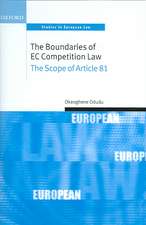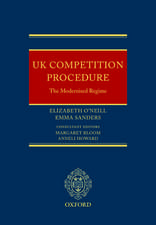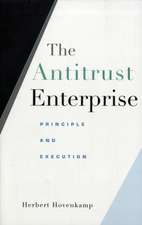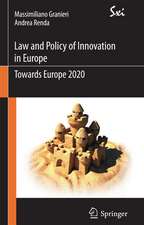Handbook of EU Competition Law
Autor Walter Frenz Traducere de Craig R. Airden Limba Engleză Hardback – 15 ian 2016
Preț: 1881.76 lei
Preț vechi: 2294.83 lei
-18% Nou
Puncte Express: 2823
Preț estimativ în valută:
360.17€ • 374.59$ • 301.82£
360.17€ • 374.59$ • 301.82£
Carte disponibilă
Livrare economică 21 februarie-07 martie
Preluare comenzi: 021 569.72.76
Specificații
ISBN-13: 9783662485910
ISBN-10: 3662485915
Pagini: 1507
Ilustrații: XXI, 1507 p.
Dimensiuni: 155 x 235 x 71 mm
Greutate: 2.31 kg
Ediția:2016
Editura: Springer Berlin, Heidelberg
Colecția Springer
Locul publicării:Berlin, Heidelberg, Germany
ISBN-10: 3662485915
Pagini: 1507
Ilustrații: XXI, 1507 p.
Dimensiuni: 155 x 235 x 71 mm
Greutate: 2.31 kg
Ediția:2016
Editura: Springer Berlin, Heidelberg
Colecția Springer
Locul publicării:Berlin, Heidelberg, Germany
Public țintă
Professional/practitionerCuprins
Part I: General principles.- Part II: Business Cooperations and Coordination Actions.- Part III: Abuse of a dominant position.- Part IV: Anti-trust proceedings.- Part V: Concentrations.- Part VI: Special considerations in cases of state influence.
Notă biografică
Prof. Dr. Walter Frenz, RWTH Aachen University, Unit of Mining, Environmental and European Law, Aachen, Germany
Textul de pe ultima copertă
This handbook offers detailed descriptions of EU competition law, including mergers and public authorities. Above all, it analyzes and discusses recent decisions of the ECJ and the General Court. Presenting systematically structured and theoretically founded content, the book also includes recommendations for practitioners. Special attention is paid to the scope of penalties and the influence on fundamental rights. Rounding out the book, the conflict between safeguarding confidential information and the effectiveness of private and public enforcement is discussed intensively in the context of the new Directive 2014/104/EU.
Caracteristici
Covers the latest decisions (e.g. Intel, API, Dimosia) Systematically structured Examines in detail the influence on fundamental rights, as well as the conflict between confidential information and the effectiveness of private enforcement regarding Directive 2014/104/EU Includes supplementary material: sn.pub/extras













